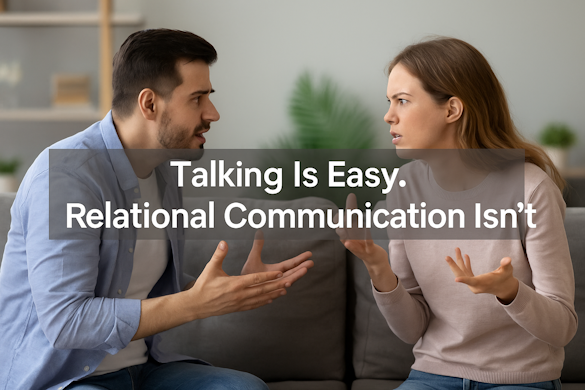It's New Year's Eve, and somewhere between the champagne and the countdown, you'll probably promise each other something about next year.
"More date nights." - "Better communication." - "Less fighting." - "More connection."
And if you're like most couples, by mid-February those promises will be gathering dust alongside the gym membership and the meal prep containers.
It’s Not Just Control—It’s Disconnection.

Sometimes it’s obvious.
One partner always makes the final decision.
They control the finances, the schedules, even the tone of the conversation.
Other times, it’s more subtle.
One of you talks more. The other shrinks.
Someone leads. Someone follows.
And even if no one says it out loud—you both feel the imbalance.
If this sounds familiar, you’re not alone.
It’s Not Just About Who’s in Charge
When power isn’t shared in a relationship, it starts to chip away at connection.
You may notice patterns like:
- One person always apologizes first
- Decisions are made without real discussion
- One partner feels dismissed or overruled
- The quieter partner stops bringing things up
Over time, this creates resentment.
And in many cases, shame.
Because when one person holds all the power—whether it’s emotional, financial, or verbal—both partners lose trust.
Power Imbalance Is Often Unconscious
No one sets out to dominate their partner.
But our early relationship blueprints run deep.
Maybe you grew up in a home where one parent had all the say.
Maybe you learned that speaking up caused conflict—so you stopped.
Maybe you’re still learning what healthy relational power even looks like.
Often, these dynamics aren’t malicious.
They’re inherited.
But unless they’re named, they stay stuck.
So How Do You Rebalance the Relationship?
Start with courage. And compassion—for both of you.
Here’s where I guide my clients to begin:
Name the imbalance.
Say it out loud, gently:
“I feel like I don’t have much say in this.”
“I notice I’m waiting for your approval instead of sharing what I think.”
Get curious, not defensive.
If your partner names a power dynamic—don’t rush to deny it.
Ask where they feel it most. Listen. Breathe.
Share decisions more deliberately.
Power doesn’t have to mean control. It can mean collaboration.
Start by co-creating small choices—like weekend plans or budget goals.
Watch your voice.
Not just the volume, but the impact.
Does your tone invite openness? Or does it shut things down?
Know when to get support.
Some patterns are tough to shift on your own.
A skilled couples therapist can help you name the power dynamics without blame—and begin restoring balance with real relational tools.
This Isn’t About Blame—It’s About Growth
If you’re reading this, it likely means you care.
You want something different.
And that’s the first step toward change.
Because the goal isn’t for one of you to be “in charge.”
It’s to stand side-by-side—with clarity, respect, and shared responsibility.
When both voices matter, love gets safer.
And real partnership begins.











